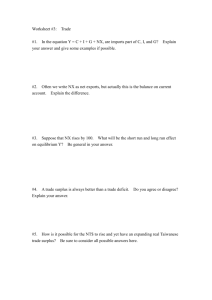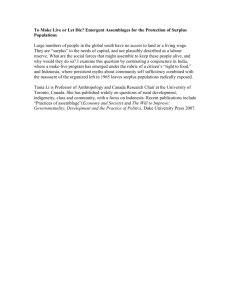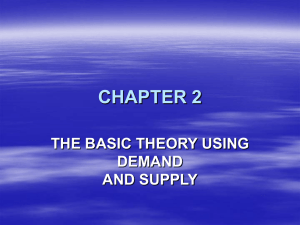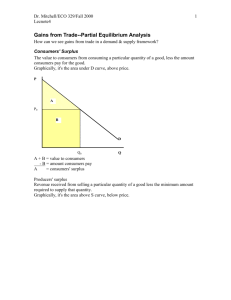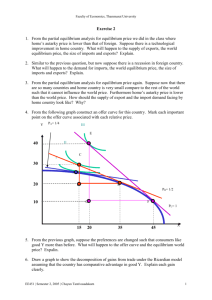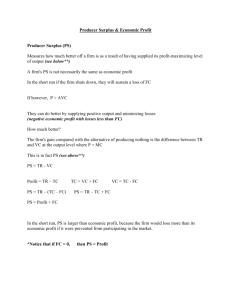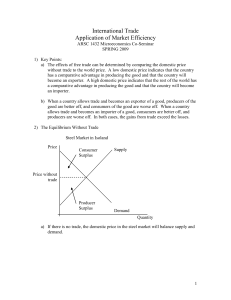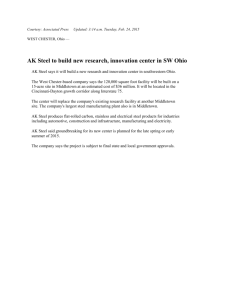Welfare Analysis of Two
advertisement
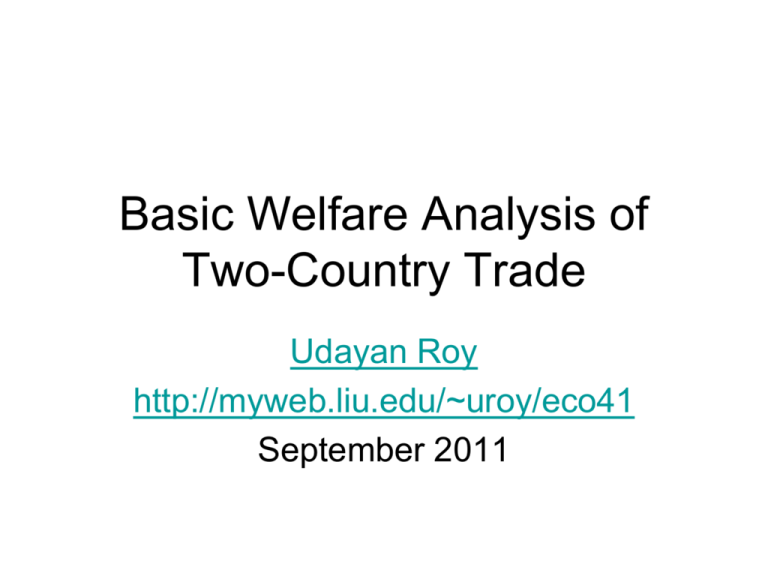
Basic Welfare Analysis of Two-Country Trade Udayan Roy http://myweb.liu.edu/~uroy/eco41 September 2011 Recap: If the autarky equilibrium price is the same for both countries, no trade will occur even when trade is allowed. In this case, trade changes nothing. Price Europe + Japan = World Quantity When International Trade Changes Nothing When the price remains at the autarky level even after trade is allowed, trade has no effect on consumer surplus, producer surplus, and total surplus. Price of Steel Domestic supply Consumer surplus Equilibrium price World Price Producer surplus Domestic demand 0 Equilibrium quantity Quantity of Steel No Change = No Fun • If, for any country, free trade relative prices are the same as its pre-trade (or autarky) relative prices, then that country will be neither better off nor worse off as a result of trade. • This does not mean that no citizen of that country will be worse off when autarky ends and free trade begins, but that the losses of those who lose will not exceed the gains of those who gain, so the country as a whole will not lose. Change = Fun • And if, for any country, free trade relative prices are different from the pre-trade (or autarky) relative prices, then that country will gain from trade. • Again, this does not mean that every citizen of the country will gain from trade, but only that the gains of the gainers will exceed the losses of the losers, so that the gainers will, at least potentially, be able to compensate the losers and still have some gains left over for themselves. – See the handed-out copy of Chapter 9 of Principles of Economics, fourth edition, by N. Gregory Mankiw The high-price country in autarky, Europe, becomes the importing country under trade. Prices fall. Production falls. The low-price country in autarky, Japan, becomes the exporting country under trade. Prices rise. Production rises. Price Europe + Japan = World Quantity Japan: The Exporting Country Price of Steel Domestic supply Price after trade World price Price before trade Exports 0 Domestic quantity demanded Domestic demand Domestic quantity supplied Quantity of Steel Japan: The Exporting Country Price of Steel Price after trade Domestic supply Exports A B Price before trade World price D C Domestic demand 0 Quantity of Steel The Winners And Losers From Trade: Exporting Country • Domestic producers of the exported good are better off, and • Domestic consumers of the exported good are worse off. • Trade raises the economic well-being of the nation as a whole. That is, the gain to producers exceeds the loss to consumers. Europe: The Importing Country Price of Steel Domestic supply Price before trade Price after trade World price Imports 0 Domestic quantity supplied Domestic quantity demanded Domestic demand Quantity of Steel Europe: The Importing Country Price of Steel Domestic supply A Price before trade Price after trade B C D Imports World price Domestic demand 0 Quantity of Steel The Winners And Losers From Trade: Importing Country • Domestic producers of the imported good are worse off, and • Domestic consumers of the imported good are better off. • Trade raises the economic well-being of the nation as a whole because the gains of consumers exceed the losses of producers. The Winners And Losers From Trade • Irrespective of whether a country exports a good or imports it, the gains of those who gain exceed the losses of those who lose. • That is, the net change in total surplus is always positive. Had the world price been equal to the autarky price, there would have been no trade and, therefore, no gains from trade. Price of Steel When the world price is WP1, the country imports steel and the gain from trade is A. When the world price is WP2, the gain from trade is A + B. That is, the greater the change in price caused by trade, the greater the gains from trade. Domestic supply Price before trade A WP1 B WP2 0 Domestic demand Quantity of Steel More Change = More Fun • The bigger the difference between free trade relative prices and autarky relative prices, the bigger will be the country’s gains from trade Less Change = Less Fun • If there is an increase in the relative price of a country’s imported good, – its national welfare will decrease, and – the national welfare of the country or countries that the good is being imported from will increase. – See “The Welfare Effects of Changes in the Terms of Trade” in page 116 of KO. Growth Under Trade: Mixed Blessing I • Economic growth in a country can affect (worldwide) relative prices under free trade. • If economic growth in a country leads to an increase in the relative price of its imported good (i.e., to a fall in its terms of trade), the country could be worse off • The other country (i.e., the rest of the world), however, will be better off. • The world will be better off There is an increase in Europe’s demand for its imported good. This increases (worsens) its terms of trade and decreases (improves) Japan’s terms of trade. Price F A C G D N I B H J E L Europe + K P M Japan O Q R = World Quantity Growth and Terms of Trade Europe Japan World Before After Before After Before After Consumer Surplus ABCD ABFG IJ I NP NO Producer Surplus E CE LM JKLM R PQR ABCDE ABCEFG IJLM IJKLM NPR NOPQR Total Surplus Europe’s growth has a positive effect (FG) and a negative effect (the loss of D) from the worsening of the terms of trade. The worsening of Europe’s terms of trade implies an improvement of Japan’s terms of trade (and the gain of K). The World gains OQ from growth in Europe. Note: O + Q = F + G + K - D. Growth Under Trade: Mixed Blessing II • If economic growth in a country leads to an increase in the (worldwide) relative price of its exported good, this country will be better off • The other country will be worse off • The world will be better off There is an increase in Japan’s demand for its exported good. This increases (worsens) Europe’s terms of trade and decreases (improves) Japan’s terms of trade. Price A C D J E L Europe + N F I B K P G M Japan O Q R = World Quantity Growth and Terms of Trade Europe Japan World Before After Before After Before After Consumer Surplus ABCD AB IJ IF NP NO Producer Surplus E CE LM GJKLM R PQR ABCDE ABCE IJLM IFGJKLM NPR NOPQR Total Surplus Japan’s growth has a positive effect (FG) and another positive effect (K) from the improvement of the terms of trade. The worsening of Europe’s terms of trade reduces welfare by D. The World gains OQ from growth in Japan. Note: O + Q = F + G + K - D. Foreign Aid Can Be a Mixed Blessing I • If the aid-receiving country imports food, and • if it has a higher marginal propensity to spend on food than the donor country, – The fraction of each additional dollar of income that is spent on food is the marginal propensity to spend on food • then foreign aid will increase the relative price of food – thereby worsening the recipient country’s terms of trade and improving the donor country’s terms of trade • Thus, it is a theoretical—but only theoretical—possibility that foreign aid may help the donor country and hurt the recipient country! Foreign Aid Can Be a Mixed Blessing II • The idea is conveyed by the slide on growth and terms of trade. • Let Japan be the aid donor and Europe be the aid recipient. • The receipt of aid will shift Europe’s demand for its imported good to the right. • The donation by Japan should shift its own demand for food to the left. • But assuming that its marginal propensity to spend on food is low, Japan’s demand shift may be ignored. • Then, the aforementioned slide applies to this slide’s topic—the receipt of foreign aid—as well.
